VIENNA, August 31st, 1922.
Dear Dr. Hill: --
You will have been following in the papers the critical situation here and I expect you get many reports from Americans here. I know you will [sympathize] with the poor Friends Relief Mission in our attempt to carry on when all the other foreign Relief [Organizations] have given up the attempts to tide over Austria’s emergency. It is depressing work -- and yet we cannot quite give up hope and we cannot leave as long as we can secure any funds at all.
I am venturing to send you a copy of our proposals for the Winter work. It is pretty ambitious to try to get as much money as this nowadays, but we believe [there] are really a great many people who do not want the Viennese to perish after all that has been done for them and who will try to make up this winter for the folly and cruelty that our Governments have shown in not giving adequate credits long ago or else allowing Austria to join Germany.
The Land Settlement movement is succeeding in a marvelous way in spite of difficulties which one would think insurmountable. The help which we have been able to give them is the most completely satisfactory part of our work -- but of course we cannot apply all our funds to them as we are simply bound to do something for the piteous cases needing immediate relief who cannot participate in the Land Settlement scheme. The fact, however, that most of our food relief is given in the form of fresh milk means that the town will benefit permanently from this expenditure as well as individuals benefiting temporarily, because the cows which we import from the Provinces to Vienna, about 70 a month, remain here and their milk continues to come to the town after our contracts with the farmers have been paid off, and the farmers benefit from having more manure and calves and so can improve their farms and increase food production. [page 2]
Is there any possibility that the A.R.C. would again cooperate with us and make us a grant for any part of this [program]?
Another matter about which it is very much on my mind to write to you is the state of affairs in the Eastern part of what is now Poland -- the strip of country which used to be White Russia -- and a bit of the Ukraine, which Poland took from the Bolsheviks in 1921.
I have just been with Miss Courtney on a visit to the work which the Poland Mission of the Society of Friends is doing in that district. I do not know whether you know that the Unit working in Poland had some difficulty during 1920 and the beginning of 1921 in deciding on the best line of work to pursue for the relief of the great distress in Poland. The position was of course extraordinarily difficult on account of the continued fighting. After peace was made, however, a more clear line of work opened up before them and I wish you could see how, under Miss Barrow’s excellent leadership, they have built up a really first-rate piece of constructive relief work. They have had the benefit of a particularly capable set of young American workers, sent by the American Friends’ Service Committee, whose knowledge of agricultural conditions has been invaluable.
The general plan of work, which is [organized] from seven different outposts scattered over this large area (from North to South [Buresa?] and Halicz, Drohiczyn, Horodec and Kobryn, [Povorsk] and Holoby) is as follows: --
About 1000 horses having been obtained from the Government at a nominal price last winter, most of these are divided into “ploughing columns” -- about 30 horses in each with 15 ploughs. Several columns work from each outpost and each is under control of an employee of the Mission, Polish (or sometimes Russian), specially qualified for the work. A Mission member at the outpost supervises the whole. Each column takes a village and the most needy peasants are each allowed the use of a plough for one or two days, driving it [himself] (or sometimes herself) under strict supervision that the horses are properly treated and not overworked. [page 3]
Some horses have been reserved for “Timber hauling columns” and work in the same way fetching the timber which the Government had granted the peasants, but which many of them are entirely unable to [utilize] because it is many miles away and they have no horses.
Alongside these two big pieces of work, the Mission is giving temporary help to enable the peasants to tide over the interval before they get their harvest from the land which has been ploughed. Rations are given free to the refugees as they return, to last for a week or two, and then flax and wool are distributed for them to spin and weave and they are paid for the thread and cloth they bring back, so that they can buy food. In cases of illness, young children or special poverty, food rations are distributed either in additional payment for the spinning and weaving or as a gift when there is no one able to earn. A great deal of very attractive embroidery on linen is done in these districts and the Mission gives further employment by buying all that the peasants can do for sale in London, making quite a good profit for the relief funds. Under careful supervision the quality of the work has improved and the women are learning to make articles to order so that there will be the possibility of a permanent business for them. In the districts where the soil is poor, an additional means of earning is very important.
I have omitted to mention the extensive seed distribution which the Mission has also contributed -- rye, buckwheat, flax and various garden vegetables.
You will see that this is a [program] aimed at putting the people on their feet, and as it has the most splendid cooperation on the part of the peasants, it has succeeded where it has had a chance. The peasants who were helped in Volhynia in the autumn of 1921 and the following 6 months are now cheerful and independent and full of gratitude and the Mission has left them with an easy mind.
But in the districts where they only began to help this year, even those who ploughed in the spring are not all self-supporting yet -- though many are -- widows and families where there is illness have a bad prospect for the winter as they could not sow rye, the main bread crop, till the Autumn, and will not get the [page 4] harvest till next year. Worse still is it for those poor refugees who only got back this summer and who are now being ploughed for -- they have nothing to live on in the winter unless the Mission can obtain more funds and stay and help them till the harvest.
I am sure if people in America knew what has been done, how successful it has been, and how sure we could be of success if it could be continued a little longer, the funds would come in.
I do not think I need reiterate to you the overwhelming sufferings and needs of this trebly unfortunate peasantry -- who were just driven Eastwards and their homes [burned] by the barbarous military methods of the Czarist Army, then suffered from the famine in the Volga valley, and when at last they could attempt the journey back found themselves in the grip of typhus or of dysentery. Those who reached their own land found no house, no plough, no horse or other animals and saw their good arable soil overgrown at best with weed, at worst with young birch trees 8-10 feet high. I do not think one could imagine a more cruel fate falling on a people more completely innocent of its causes.
Now the urgent question is, can funds be found to carry through the Friends’ [program] or for any other body of workers to take on similar work? Can the A.R.C. reopen work in Poland, either with its own personnel or entrusting funds to the Friends?
The matter is urgent as the seed must go in soon, directly the ploughing is over the horses should be used for timber hauling so that the peasants may build their long huts and leave the wretched dugouts and wigwams in which they are now herded and dying of typhus and dysentery.
I don’t think I need [apologize] to you for telling you about all this -- I know you will do something if you can -- but that it may be impossible.
With many kind remembrances to Mrs. Hill and yourself,
believe me
Yours very sincerely,
HILDA CLARK.
Encl.

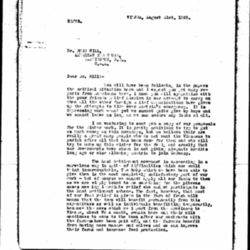
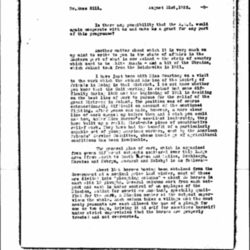
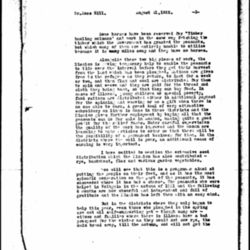
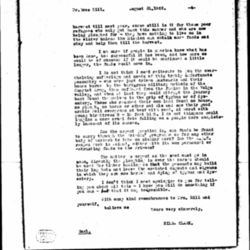
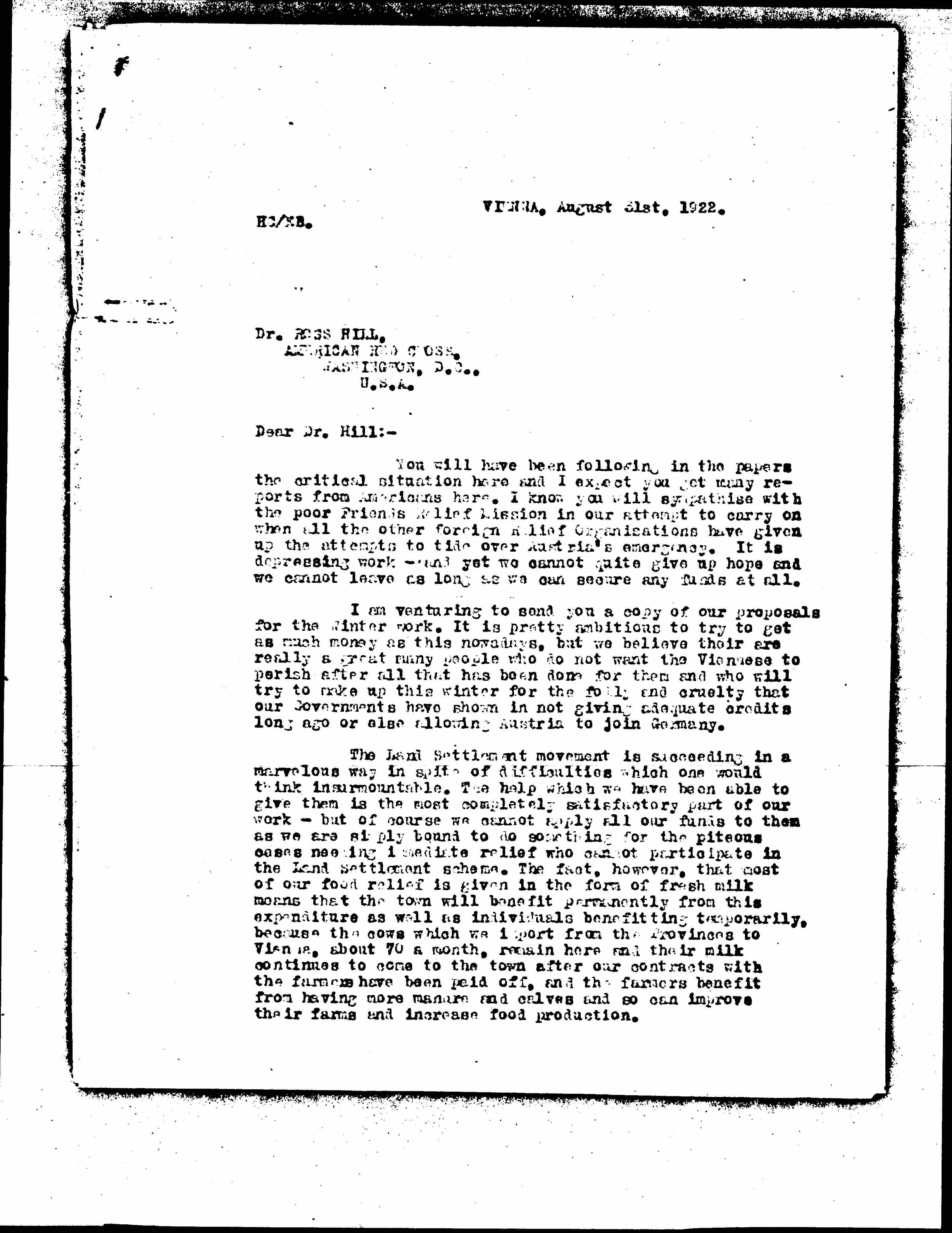
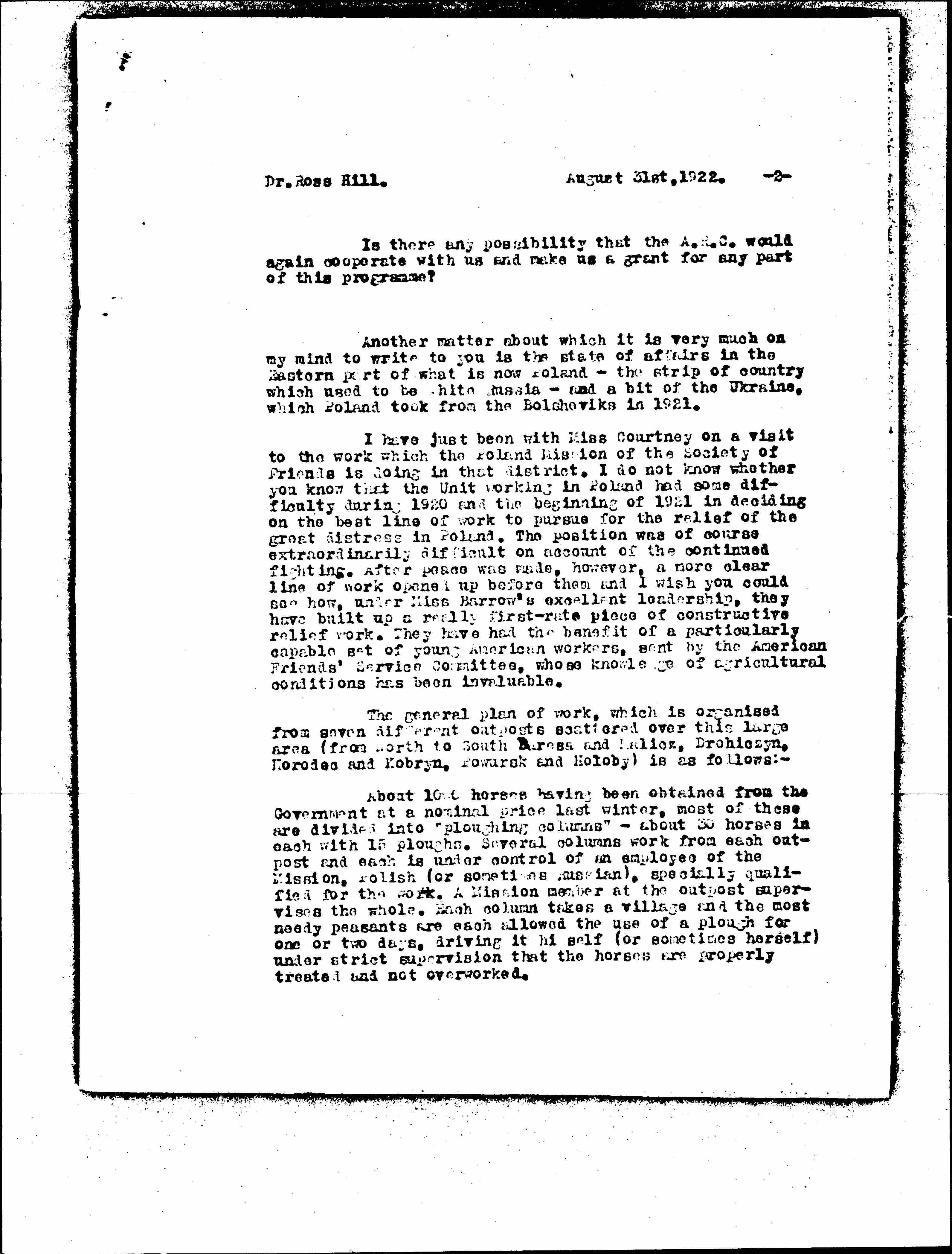
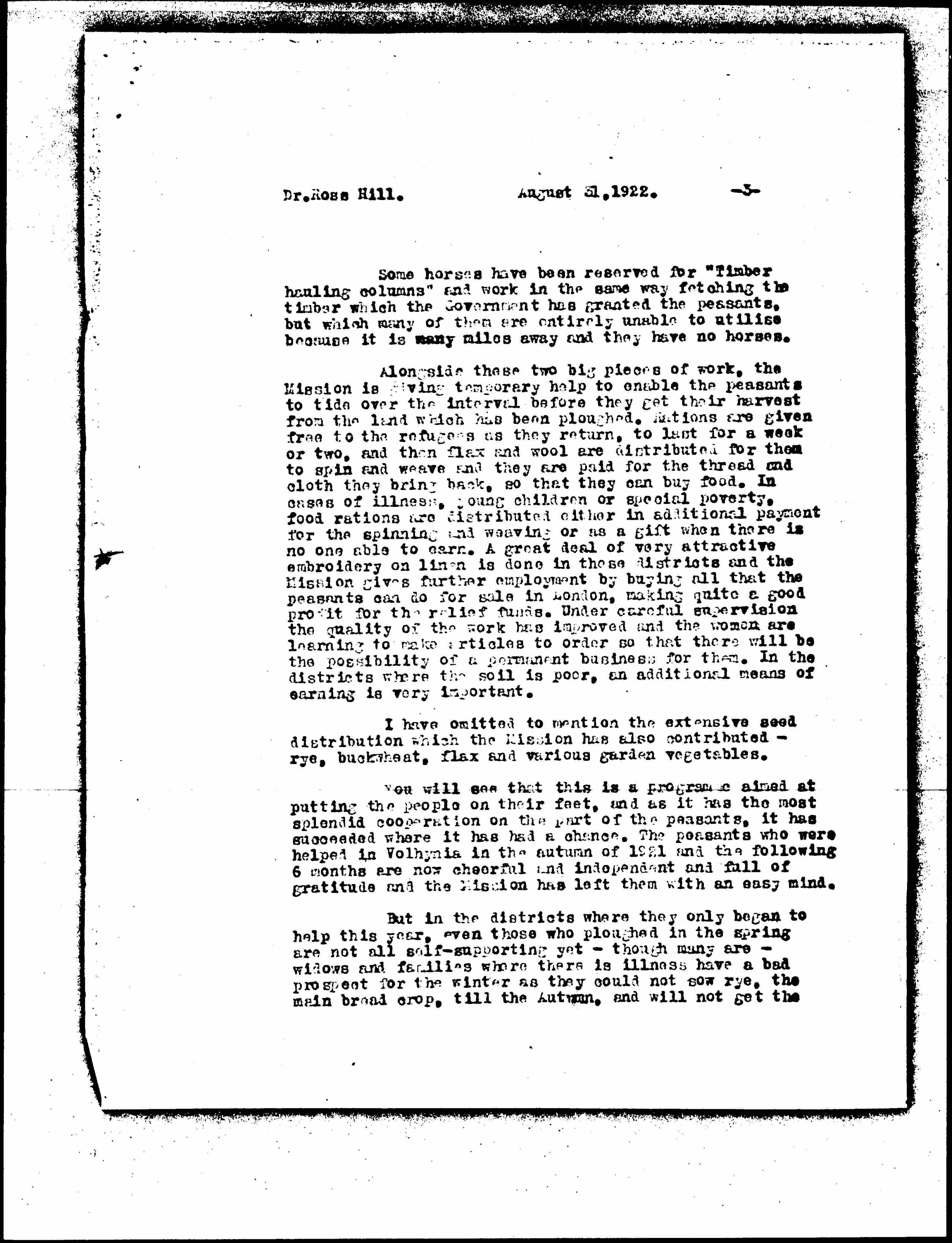
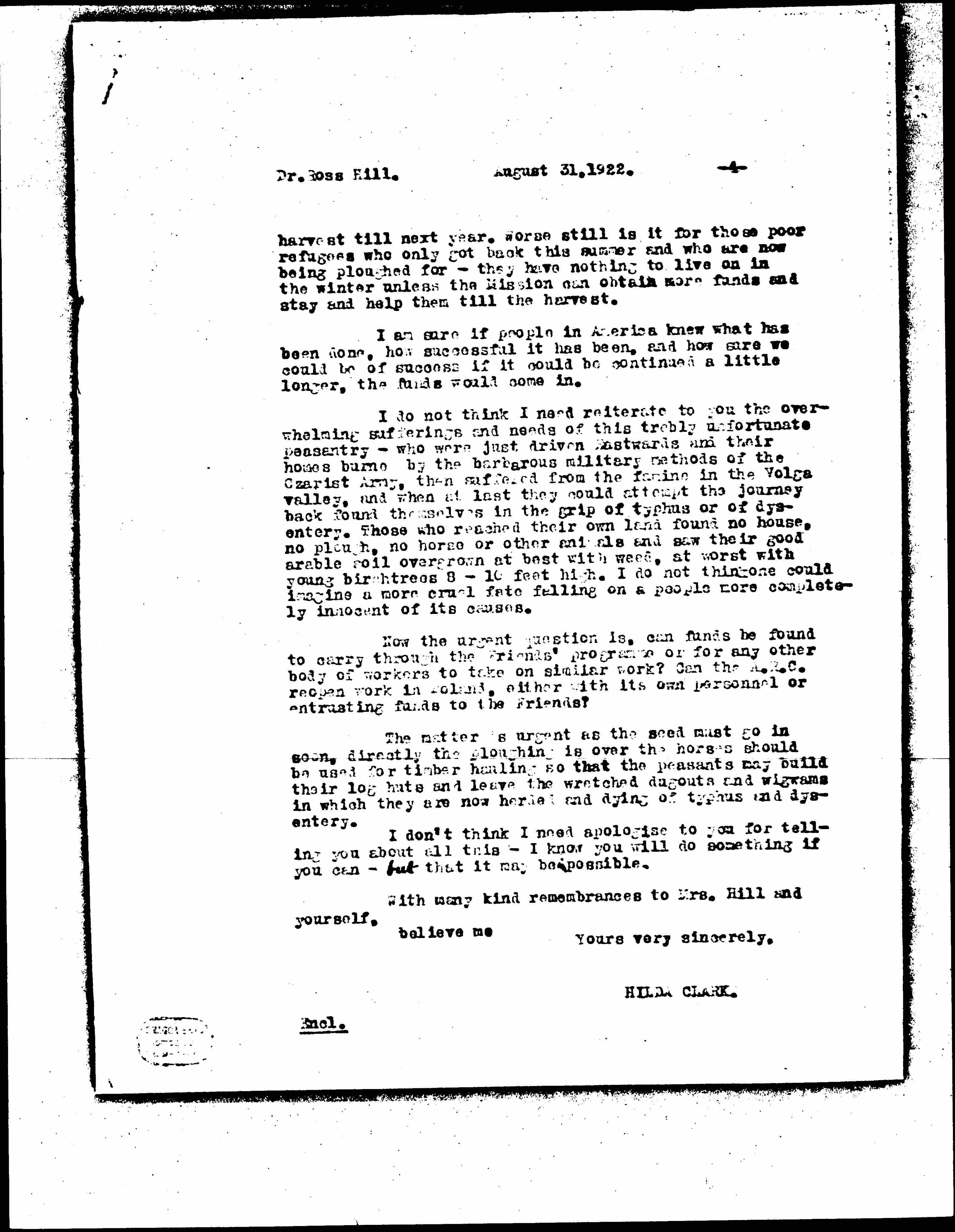




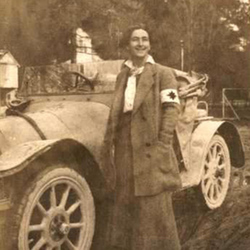

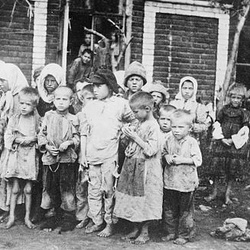






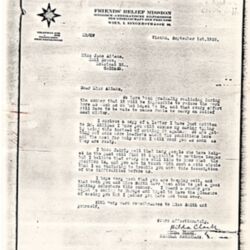
Comments